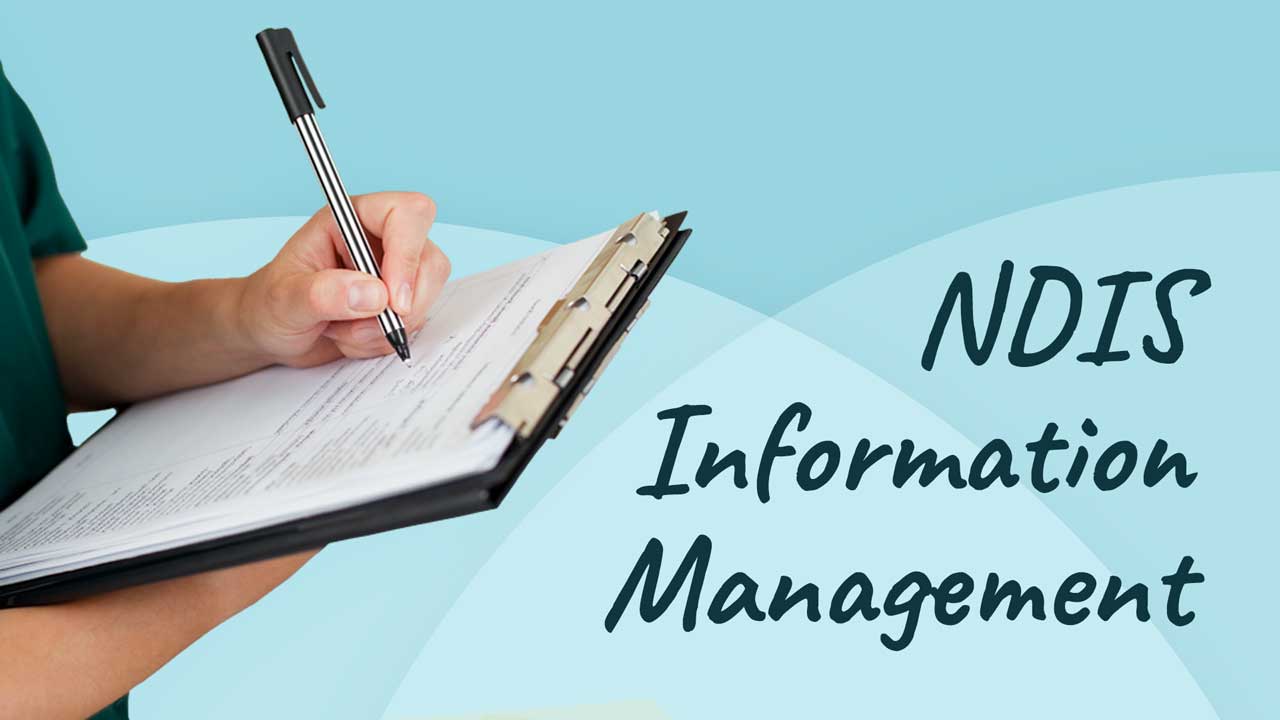Providers of National Disability Insurance Scheme (NDIS) services must ensure that NDIS participants’ information is collected, stored, and disclosed appropriately and in a way that respects their privacy and confidentiality.
What Classifies as Health Information?
Health information is any information regarding a person’s health or disability and any information that relates to a health service they have received or will receive (Better Health Channel 2015).
What is Information Management?
Information management involves obtaining, analysing and protecting health information in digital and handwritten forms (AHIMA n.d.).
According to the International Organisation for Standardisation, the steps of effective information management are:
- Establishing an ‘Inventory of Information Assets’ that keeps track of:
- Every location where information is stored, processed or accessible, such as:
- IT hardware
- Software
- People
- Physical files
- The owners of this information.
- Every location where information is stored, processed or accessible, such as:
- Collecting and classifying information in accordance with a classification system.
- Handling information in a secure way depending on its classification type, according to the organisation’s policies and procedures.
(St Clair 2023)

Information Management Tips
The top 10 administrative record-keeping tips, as listed by the Australian Department of Health (2021), are:
- Planning what processes are needed for information to be effectively maintained, and determining how these processes can be achieved.
- Collecting and storing information consistently and ensuring that all workers follow the same policies and procedures.
- Clearly communicating expectations to workers and ensuring they understand the relevant policies and procedures.
- Providing appropriate staff training.
- Appropriately allocating the resources (e.g. workers and physical resources) needed in order to manage information.
- Modifying the information management system if a more efficient method arises.
- Embracing new technology that may improve efficiency.
- Delegating information management responsibilities to appropriate workers.
- Being aware of responsibilities and obligations, such as what to record, how to maintain records and how long records should be kept.
- Reviewing the information management system and seeking feedback from workers in order to facilitate continuous improvement.
Information Management in the NDIS Practice Standards
Information management is a requirement of the NDIS Practice Standards under Core Module 2: Provider Governance and Operational Management.
This Practice Standard aims to ensure that providers manage health information in a way that ensures it is identifiable, accurately recorded, up-to-date and confidential. Furthermore, this information should be easily accessed by participants and appropriately used in the delivery of supports (NDIS 2021).
NDIS providers must meet the following quality indicators:
- Providers must obtain consent from participants before obtaining, using, retaining, or disclosing their information. Participants should be informed about situations in which their information could be disclosed, including without consent if required by law.
- Participants should be informed about:
- How their information is being stored and used
- When and how they can access or change their information
- When and how they can revoke or change their prior consent.
- Providers maintain an information management system that is relevant and proportionate to the size and scale of the organisation and records participant information accurately and in a timely manner.
- Providers store documents with appropriate use, access, transfer, storage, security, retrieval, retention, destruction, and disposal processes. These processes must be relevant and proportionate to the scope and complexity of the supports being delivered.
(NDIS 2021)
Consent and Disclosure of Information
Read: Privacy and Dignity: NDIS Provider Rights and Responsibilities
Recording Health Information

Recording progress notes and other information is crucial to delivering high-quality support (St Clair 2023).
Effectively documenting information helps to:
- Improve the efficiency of operations
- Ensure transparency
- Maintain the security of confidential information
- Support staff to work more effectively
- Increase staff retention
- Improve business continuity
- Measure progress towards the participant’s goals
- Provide a record of events that have occurred during an appointment or shift
- Ensure members of the care team can identify, communicate, and coordinate around the participant’s needs
- Provide evidence that supports are being delivered properly and the participant is being appropriately cared for.
(DoH 2021; St Clair 2023)/
Read: Record Keeping and Documentation
When recording progress notes, clinical records, reports or planning documents, workers should:
- If writing by hand:
- Ensure their handwriting is legible
- Use a pen rather than a pencil
- Correct errors by ruling a line through the mistake, writing the correction, and initialling the change. The original entry should still be readable. Avoid erasing or using whiteout.
- Ensure that observations and actions are documented accurately and the facts of the situation are clearly stated.
- Use familiar and comfortable language and avoid technical jargon.
- Record information as completely and concisely as possible, ensuring that documentation is brief, simple, and direct.
- Ensure observations, events, and conversations are recorded as soon as possible after they occur so that entries are as complete and accurate as possible.
- Ensure all entries are signed and labelled with the correct date and time.
- Follow their organisation’s policies and procedures on date and time format, use of initials, position designations, and other identifiers.
- Ensure that participants’ records are easily distinguishable.
- Ensure they have the correct participant’s record before making an entry, especially when documenting healthcare or medicines.
- Check previous entries and progress notes to ensure continuity and coordination in supports.
- Only use abbreviations that are listed in organisational guidelines.
(St Clair 2023)
Test Your Knowledge
Question 1 of 3
When documenting health information by hand, which one of the following practices should be followed?
Topics
References
- American Health Information Management Association n.d., Health Information 101, AHIMA, viewed 23 August 2024, https://www.ahima.org/certification-careers/certifications-overview/career-tools/career-pages/health-information-101/
- Better Health Channel 2015, Confidentiality and Privacy in Healthcare, Victoria State Government, viewed 23 August 2024, https://www.betterhealth.vic.gov.au/health/ServicesAndSupport/confidentiality-and-privacy-in-healthcare
- Department of Health 2021, Administrative Record Keeping Guidelines for Health Professionals, Australian Government, viewed 23 August 2024, https://www.health.gov.au/sites/default/files/documents/2021/06/administrative-record-keeping-guidelines-for-health-professionals.pdf
- NDIS Quality and Safeguards Commission 2021, NDIS Practice Standards: NDIS Practice Standards and Quality Indicators, Australian Government, viewed 23 August 2024, https://www.ndiscommission.gov.au/sites/default/files/2022-02/ndis-practice-standards-and-quality-indicatorsfinal1_1.pdf
- St Clair, R 2023, ‘The Importance of Record Keeping and Information Management for NDIS Providers’, Talking Disability, viewed 23 August 2024, https://www.disabilitysupportguide.com.au/talking-disability/the-importance-of-record-keeping-and-information-management-for-ndis-providers

